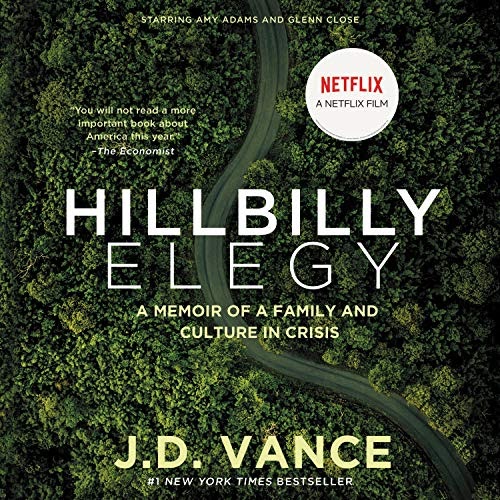Hillbilly Elegy Review

Audible (Amazon)
Hillbilly Elegy, Ron Howard’s adaptation of J.D. Vance’s bestselling memoir, focuses on the struggles of poverty and working-class white America. The film is a must-see this holiday break, even though some critics say otherwise.
Near the beginning, J.D., a Yale law student, attends a fancy dinner with representatives from the top law firms around the country, hoping to land a summer job. Coming from a poor family, J.D. is bewildered by the number of forks and knives at his place setting, and calls his girlfriend and classmate, Usha, who assists him with his upper-class manners.
J.D., a former U.S. Marine and Ohio State undergraduate, is a fish out of water at Yale. After mentioning his rural family background, his attendance at a state school, and experience in the Marines, awkward silence uncovers the limited perspectives at elite institutions nationwide.
J.D. is soon called back to Ohio after his mother overdoses on heroin. Her drug addiction and instability as a parent create drama throughout the movie and result in J.D. growing up under his grandmother Mamaw’s supervision.
Mamaw’s impact on J.D. is the most memorable part of the film. After he receives bad grades, uses drugs, and falls under the influence of a questionable group of friends, his grandmother escapes from the hospital to take care of him while fighting pneumonia herself. Her dedication to J.D.’s growth as a person is evident. Will del Hierro, a Latin School sophomore, noted, “My favorite part was probably when the grandma made J.D. stop hanging out with his bad friends and taught him to have a work ethic.” This scene was my favorite as well.
When J.D. witnesses his Mamaw struggling to put food on the table, he understands her strict parenting. He immediately begins cleaning the house, ceases his bad habits, and improves his grades to become the first in his family to attend college.
At one point in the movie, J.D.’s mother threatens to crash the car, which would kill both her and J.D. Her erratic behavior, constant yelling, and impatience can make the movie seem melodramatic. Many critics claim that the drama in Hillbilly Elegy takes away from the messages conveyed in the widely renowned book.
The memoir mainly focuses on America’s white working class, and it received extra recognition after Donald Trump’s election in 2016. J.D.’s memoir offers a firsthand account of impoverished America and explores the reasons behind parental and household dysfunction.
The movie, however, largely sidesteps this theme, focusing instead on individual members of the family and how they relate to each other. Critics argue that this focus takes away from the larger meaning; some even say that no meaning existed. Many said they were left perplexed about whether the movie was supposed to be about a certain class, culture, or place.
Will offered a different take, though. “I think many people were biased because they were upset that the movie was more drama-based than informative like the book,” he said. “However, I thought the progression of J.D. from poverty to a Yale law student was uplifting and inspiring.”
I could not agree more.
Despite receiving negative critic reviews and a low score of 26% on Rotten Tomatoes, Hillbilly Elegy remained on the top 10 watched movies and shows in the U.S. on Netflix for over a week. It is well worth the watch over the holidays and deserves much more credit than the critics give it.

Akshay Garapati (’23) is excited to be serving his first term as the Sports Editor for The Forum. Previously, he served as the Opinions Editor. Editing...























































